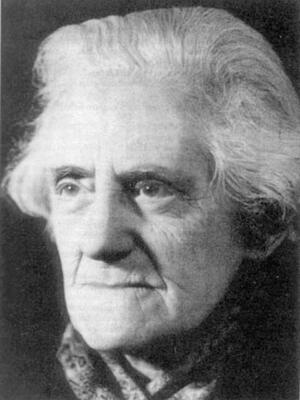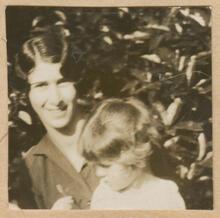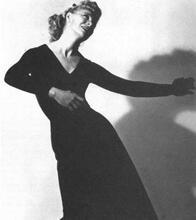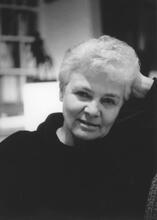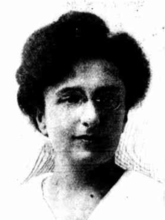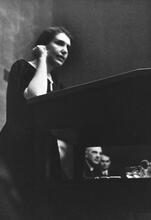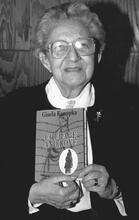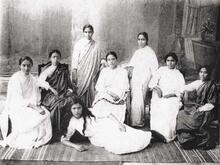Nelly Wolffheim
Nelly Wolffheim began her career as a teacher in Germany but struggled to continue working through her mental health issues. It was during her recovery from these issues that she discovered the studies of Sigmund Freud, which, to her, explained the intersection of her interests and struggles. Based on Freud’s psychoanalytic theory, Wolffheim developed a kindergarten curriculum in which she encouraged children to express their sexual desires. The Nazi rise to power restricted her ability to study psychoanalysis and Wolffheim began teaching pedagogy to Jewish kindergarten teachers, but she was ordered to close her school in 1939. She escaped to England, and while she initially struggled to adjust to the life of an emigrant, she eventually began publishing articles about her work after the war.
Early Life and Teaching Career
“... Being with children has a wonderful effect on me. They take possession of my heart and I just love them.” This quotation from Nelly Wolffheim, a pioneer in psychoanalytic pedagogy, is an apt self-description of a woman who dedicated a lifetime of work so that children might have better lives.
Born on March 29,1879, in Berlin, Germany, Nelly Wolffheim and her brother grew up in a wealthy family; her father was a successful merchant. However, it was not a happy or supportive family. Her parents expressed a thousand concerns for their own health, worrying over every minor ailment. Nelly’s childhood was compromised by their fears. An anxious child, often afflicted by poor health, Nelly grew up lonely and secluded in a family bedeviled by illnesses real and imaginary.
A private tutor acquainted Nelly with the goals and ideas of the feminist movement in Germany. Wolffheim internalized feminism to the point that she made a decision not to marry and not to depend on a man to support her; she had no intention of becoming a bored wife. Instead, she chose to pursue an education that would prepare her for self-sustaining employment. In 1896 she began that education at the Pestalozzi-Fröbel-Haus in Berlin, a school for modern pedagogy. Unfortunately, after completion of her education she was so often seriously ill that she could not work in her profession, so she became a patient in various hospitals and spas. Unable to work, but with much time to think and to read, she began to develop theories and to write about teaching difficult, unstable and psychologically sick children.
By 1910 Nelly Wolffheim again felt well enough to work with children, giving lessons in manual skills (Handfertigkeitsunterricht) as a kind of occupational therapy for nervous children.
Four years later, at the age of thirty-five, she opened her own private kindergarten in her apartment on Johann-Georg Street 20, Berlin. Unfortunately, after some time at this endeavor, Wolffheim suffered a nervous breakdown and was incapable of continuing her work.
Psychological Ideology and Curriculum
During her recovery, Nelly Wolffheim read and accepted the theories of Sigmund Freud (1856–1939) whose theories illuminated for her the relationship between her mental suffering, her fragile health and her strong connection to children. Thereafter, she spent a considerable time in psychoanalysis with both Karl Abraham (1877–1925) and Karen Horney (1885–1952), followers of Sigmund Freud and pioneers in the field of psychoanalysis.
The experience of her own psychoanalytic therapy, together with reading and study, led Wolffheim to a concept of kindergarten curriculum based on Freud’s psychoanalytic theory of human beings. One of Freud’s main ideas is that children experience their own sexuality. Sexual development in humans progresses through different phases, beginning in infancy. By the time they are ready for kindergarten, children have passed through the oral, anal and genital phases and the Oedipus complex. Nelly Wolffheim’s kindergarten class was based on this theory; in it she acknowledged the sexuality of the children, encouraging them to be open and uninhibited in the expression of their age-appropriate stage of sexual development. She took the sexual fantasies and resulting psychological conflicts of the children very seriously, accepting the children’s activity of masturbation as a normal aspect of childhood.
She also supported affectionate-erotic relationships among the children, understanding them as an acceptable alternative satisfaction to the affectionate-erotic relationship the children desired, at this stage of their sexual development, with a parent who was an unavailable and inappropriate partner.
Career in Nazi Germany
When Hitler came to power in 1933, psychoanalysis in Germany was vilified as a “Jewish theory” and the Nazis systematically closed psychoanalytic institutions and impeded the work of individual practitioners. Wolffheim’s book, Psychoanalyse und Kindergarten (Psychoanalysis and Kindergarten) was burned by the Nazis during the burning of banned books in 1933. Recalling the atmosphere in Germany at that time, Nelly Wolffheim said, “Suddenly everything was ended, not only my work but also all the ideals which had been important for me. Principles for which I had fought my whole life became invalidated. It was very painful for me to watch as my work became useless.”
No longer allowed to work with her concept of psychoanalytic pedagogy, Nelly Wolffheim began to offer classes in pedagogy to prepare young Jewish women for employment as teachers. These classes were similar to those offered by the Jewish Community in Berlin to prepare women and girls for emigration and employment outside Germany. In 1934, at a time when it was difficult for Jewish females to find academic training because they were not accepted at so-called “Aryan” training centers, she opened a school for the education of kindergarten teachers in rented rooms at a number of locations. Their education as kindergarten teachers at Nelly Wolffheim’s school increased the students’ chances of emigrating and finding jobs in a foreign country.
At her school, Nelly Wolffheim continued to develop her concept of psychoanalytic pedagogy, using her knowledge of psychoanalysis to teach students how to describe their educational philosophy to children and how to do the actual work of teaching kindergarten classes using psychoanalytic pedagogy. It was important to Wolffheim that her students be able to answer their pupils’ questions as to why they had decided to become kindergarten teachers in terms that the children could readily understand. She was supportive to her students as they considered their own professional goals as well as their special teaching relationship with young children.
Emigration and Postwar Life
In March 1939 Nelly Wolffheim was ordered by the Nazis to close her school because of the circumstances then prevalent in Nazi Germany. A few months later she emigrated to London. It was not easy for her to get the required papers or the money necessary to escape Nazi Germany. Once in Great Britain she lived the daily life of an emigrant: she had almost no money and felt out of place in a strange environment and culture. Her level of fluency in English was not sufficient to continue her writing. Living first in London and then, for a longer time, in Oxford, Wolffheim earned her living working as a model for an art institute and by selling homemade toys.
After the end of World War II, Wolffheim decided to publish articles about her work in German newspapers. Though it was a difficult decision to return to addressing the German public, she was passionate about the continuation of her work and pressed by the need to earn a living. In 1956, when Nelly Wolffheim was seventy-six, she decided to enter a Jewish Home for the Elderly in London that especially welcomed Jews who had been emigrants from Nazi Germany. She felt very comfortable in this Home and spent the rest of her life there.
Nelly Wolffheim died at the age of eighty-six, on April 2, 1965.
Selected Works
Zur Geschichte der Prügelstrafe in Schule und Haus—Eine pädagogische Studie, Berlin: 1905.
Die erziehliche Beeinflussung und Beschäftigung kranker Kinder, Berlin: 1914.
“Die Einwirkung des Kindergartens auf die Kinder.” In Kindergarten, München: 1917, 29–39.
“Erotisch gefärbte Freundschaften in der frühen Kindheit.” In Zeitschrift für psychoanalytische Pädagogik, Wien (1927/28): 264–274.
Psychoanalyse und Kindergarten. Wien: 1930.
So war ich—so bin ich, 1961 (not published).
“Die Rätselhaftigkeit menschlichen Lebens.” In Deutsches Zentralblatt für Krankenpflege. Kulmbach: 1964, 83–90, 130–135, 169–179.
Berger, Manfred. “Nelly Wolffheims Jüdisches Kindergärtnerinnen-Seminar.” Theorie und Praxis der Sozialpädagogik. Bielefeld: 1989.
Berger, Manfred. Nelly Wolffheim, Eine Wegbereiterin der modernen Erlebnispädagogik. Lüneburg: 1996.
Berger, Manfred. Frauen in der Geschichte des Kindergartens, Ein Handbuch. Frankfurt: 1995.
Biermann, Gerd. Nelly Wolffheim und die Psychoanalytische Pädagogik. Gießen: 1997.
Biermann, Gerd. Psychoanalyse und Kindergarten und andere Arbeiten zur Kinderpsychologie von Nelly Wolffheim. München: 1966.
Kerl-Wienecke, Astrid. Nelly Wolffheim Leben und Werk. Gießen: 2000.
Kerl-Wienecke, Astrid. “Kinderanalyse und Frauen.” Luzifer-Amor. Tübingen: 2000.
Kerl-Wienecke, Astrid. “Nelly Wolffheim—eine Pionierin der psychoanalytischen Pädagogik.” Analytische Kinder und Jugendlichen-Psychotherapie. Frankfurt: 2001.
Ludwig-Körner, Christiane. Wiederentdeckt—Psychoanalytikerinnen in Berlin. Gießen: 1998.

